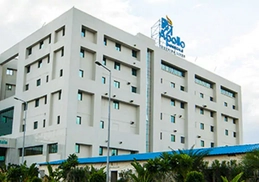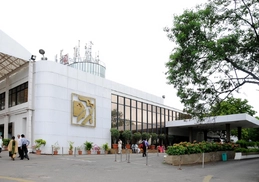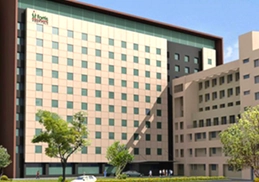
+91 8095511877

+91 8095511877
Heart transplant surgery is a procedure where doctors transplant a healthy heart from a donor to a person with end-stage heart disease.
One will have a heart transplant only when other treatments fail, and the person is not likely to live for more than a year with the diseased heart.
For heart transplant surgery, one needs a donor. A donor is a brain-dead person who breathes with the help of a ventilator. Usually, they are victims of severe head injury that causes the brain to stop working. It is vital to get the consent of the relatives for an organ transplant.
During the transplant surgery, the surgeons will remove the healthy heart of the donor as the first step. The next step is to remove the diseased heart of the recipient. Then the doctor will attach the donor heart to the recipient and connect it to the major blood vessels that go into and come out of the heart.
The surgery will take anything between six to twelve hours to complete. One will have to stay in the hospital for about two to four weeks. Complete recovery will take a few months.
It is possible to have a healthy life after a heart transplant. For getting maximum benefits, one needs to make some lifestyle changes that are healthy for the new heart.
Your heart pumps blood rich in oxygen to all parts of your body. Oxygen is necessary for the cells in your body to live. Heart diseases can cause problems with the pumping of the heart. Over time the heart 'fails' to pump an adequate volume of blood to meet your body's needs. It causes many problems in your body as the cells do not get enough oxygen.
'Heart failure' is a condition where your heart cannot go back to its healthy state and function as is necessary even after treatments. The only option left for you to lead a normal life is to have a heart transplant.
You will have a transplant surgery if you have end-stage heart failure that does not respond to any available treatments. Some of the common causes of heart failure are
There are a few criteria that you should fulfill to be eligible for a heart transplant. They include
You may not have a heart transplant
A person needs to make a lot of lifestyle adjustments after a heart transplant. Hence any person prone to tobacco or alcohol abuse is not a fit candidate. So is the case with anyone unable to take up the prescribed post-transplant care. Also, a person undergoing a transplant should have the financial resources to buy expensive anti-rejection medicines for the rest of his life.
Getting the heart from the donor
Once a donor's heart becomes available, the surgeon at the transplant center removes the heart from the donor's body. The surgeon will then preserve it in a specially cooled solution while taking it to the recipient. At the same time, the transplant surgeon will start preparing the recipient to receive the donor's heart.
Heart transplant procedure
The surgeon will make a long incision in the center of the chest to expose the heart. The doctors will then shift the blood circulation of the patient to a heart-lung machine. It performs the functions of the heart and lungs during the surgery.
The surgeons will then remove the diseased heart, except for the back walls of the atria, the upper chambers of the heart. Then the surgeons will remove the back walls of the atria of the donor's heart. The next step is to place the edges of the hearts together and to suture it.
Once the new heart is in position, the surgeons will connect the blood vessels to the new heart. It allows the blood to flow normally through the new heart. Once the blood starts flowing into it, the heart warms up and begins to beat again.
The doctors will then look for any blood leaks around the new heart. Once everything is fine, the surgeons will place the ribs back in position and secure it. The doctors will then suture the incision in the chest.
After the procedure
Soon after the procedure, the doctors will shift the patient to an ICU. The doctors will watch carefully as to how the heart functions over time. The staff will also carefully observe for any signs of organ rejection.
Once the person starts to recover, the doctors will do a few tests to monitor heart function. The patient will then go back to his room to remain there for the rest of the hospital stay.
Although heart transplant surgery is a lifesaver, there are several risks and complications that you may have to face after that. They include:
Failure of the donor's heart – At times, your body will not accept the new heart and treat it as a foreign body. When this happens, the immune system in your body will attack the cells of the new heart. You will have medicines to suppress your natural immunity after a transplant. But still, in almost ten percent of recipients, the body will reject the new heart.
Complications from drugs – You will have to take various drugs after the transplant. Some of these can damage your kidneys, while others may increase your blood sugar and blood pressure levels. You will also become more prone to infections.
Problems due to improper care after heart transplant-You need to take good care of your new heart as per the instructions of the surgeon. If you fail to do so, you will have a lot of problems. Habits like smoking, drinking, etc. can cause a lot of damage to the new heart. You will also have to take the medicines on time as well for the est of your life.
Problems with blood supply to the new heart-During heart transplant surgery, the surgeons, will connect the coronary arteries to the new heart. But at times, you can develop blocks in these arteries. It can lead to a heart attack, cardiac arrest, or heart failure.
Apart from these, heart transplant surgery also comes with the usual risks associated with every major operation.


This article has been reviewed for medical correctness and relevance by
Dr Manish Hinduja
Dr Manish Hinduja is Consultant Cardiothoracic and Vascular Surgeon at Fortis Hospitals, Mulund and Vashi, Mumbai. He has special interests in minimally invasive cardiac surgery and heart transplant surgery. His skills include total arterial coronary artery bypass surgery, valve repair surgery, valve-sparing aortic root surgeries. He is highly skilled in minimally invasive CABG and minimally invasive valve surgeries. He has various publications in important international journals. He has remained a gold medalist during his training has won the prestigious C S Sadasivam Award" from the national board. "

Apollo Chennai

Apollo Health City

Aster CMI

Fortis Escorts

Fortis Mulund

KIMS Hospital Hyderabad
Frequently Asked Questions
Can foreigners come for a heart transplant in India?
Which are the best hospitals for a heart transplant in India?
How many heart transplants are performed each year in India?
What is the cost of a heart transplant in India?